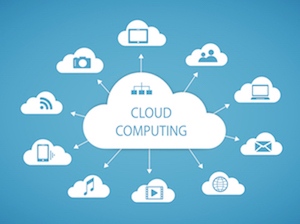cloud computing
Cloud computing is the delivery of computing services such as servers, storage, databases, networking, software, analytics and more over the Internet. In its essence, cloud computing is the idea of taking all the heavy lifting involved in crunching and processing data away from the device you carry around, or sit and work at, and moving that work to huge computer clusters far away in cyberspace. The internet becomes the cloud, and your data, work and applications are available from any device with which you can connect to the internet, anywhere in the world.
The rise of cloud-based software has offered companies from all sectors a number of benefits, including the ability to use software from any device, either via a native app or a browser. As a result, users are able to carry over their files and settings to other devices in a completely seamless manner. Cloud computing is about far more than just accessing files on multiple devices, however. Thanks to cloud-computing services, users can check their email on any computer and even store files using services such as Dropbox and Google Drive. Cloud-computing services also make it possible for users to back up their music, files and photos, ensuring that those files are immediately available in the event of a hard drive crash.
Read Also : Android App Development
Cloud computing offers big businesses some serious cost-saving potential. Before the cloud became a viable alternative, companies were required to purchase, construct and maintain costly information management technology and infrastructure. Now, instead of investing millions in huge server centers and intricate, global IT departments that require constant upgrades, a firm can use “lite” versions of workstations with lightning fast internet connections, and the workers will interact with the cloud online to create presentations, spreadsheets and interact with company software.
The biggest cloud computing services run on a worldwide network of secure datacenters, which are regularly upgraded to the latest generation of fast and efficient computing hardware. This offers several benefits over a single corporate datacenter, including reduced network latency for applications and greater economies of scale. Cloud computing makes data backup, disaster recovery and business continuity easier and less expensive, because data can be mirrored at multiple redundant sites on the cloud provider’s network.
Businesses can employ cloud computing in different ways. Some users maintain all apps and data on the cloud, while others use a hybrid model, keeping certain apps and data on private servers and others on the cloud.
Several companies and institutions now use cloud-based services because of how convenient and cost-effective they are. As a result of the flexibility and scalability offered by cloud providers, customers may pick and choose the resources and services that work best for them at a price that fits their budget.
The versatility of cloud computing is one of its main selling points. Remote employees and partners can access their data and applications from any location with an internet connection. Cloud computing also allows users to rapidly deploy new assets, which is very helpful for enterprises whose requirements are always evolving.
Businesses can lessen their influence on the environment with the help of cloud computing. Cloud service providers can lessen their impact on the environment by sharing resources and making more efficient use of computer power. In addition, by using cloud computing, companies can save on the energy and resources that would otherwise be used to host and operate their own data centers.
Cloud computing has many advantages, but it also poses significant risks. Nonetheless, customers’ trust in cloud service providers to protect their data security and privacy is not without cause for apprehension. In addition, users may incur unanticipated fees if they do not properly monitor and control their cloud resources and spending.
Flexibility, scalability, and lower costs are just a few of the many advantages that cloud computing provides to businesses and organizations. It’s possible that as cloud technology develops further, more advanced cloud-based applications will become available.

The ability to innovate and experiment is one of cloud computing’s key benefits. Thanks to cloud computing services, companies and software designers may quickly and inexpensively experiment with cutting-edge technologies and ideas without forking over significant capital. This can help businesses compete by allowing them to bring new products and services to market more quickly than their rivals.
One more perk of cloud computing is that it can deliver services that can withstand disruptions. To guarantee their services are always available and unaffected by outages or other disturbances, cloud service providers employ cutting-edge technologies. This may be especially crucial for companies whose activities are largely reliant on their IT systems.
Better serving customers is another area where cloud computing may aid organizations. Using cloud-based solutions allows businesses to offer their clients prompt, dependable service that can be accessed from any location and at any time. Businesses can use this to strengthen their connections with their clientele and increase their level of pleasure as a result.
Yet, it’s worth noting that not all workloads and apps can benefit from being hosted on the cloud. Cloud service providers may not be able to meet the needs of all applications due to the need for specialized hardware or extensive modification. It may be more cost-effective for firms to create and maintain their own infrastructure in such situations.
A final point to make is that cloud computing is not a panacea. Each provider and service type in the cloud has its own set of benefits and drawbacks. Before committing to a cloud provider or service, businesses and organizations should take the time to thoroughly assess their requirements.
An additional tool for digital transformation may be noisy computing. Businesses can speed up the introduction of cutting-edge tools and operational structures by using cloud-based services. Businesses may take advantage of cloud computing to create and release mobile apps, AI solutions, and IoT devices more quickly and efficiently.
Increased adaptability and scalability are another another benefit cloud computing may offer to enterprises. Without purchasing new hardware or setting up costly new data centers, businesses may simply increase or decrease their IT resources with cloud-based solutions. This might be especially helpful for companies whose demand fluctuates seasonally or in an unpredictable fashion.
Moreover, cloud computing can assist companies speed up the introduction of new services and products. It is possible to speed up the software development process and release new goods and services to customers by employing cloud-based development and testing environments.
In spite of the benefits, cloud computing is not without its perils. Data privacy and security worries, together with compliance and regulatory problems, can fall under this category. Before adopting cloud computing, businesses should do a thorough risk assessment and put in place the necessary controls and protections.

Last but not least, remember that cloud computing is not a panacea. Although it has its uses, it is not a magic bullet for all computer problems. Depending on their specific circumstances, businesses can benefit from on-premises infrastructure, private cloud, or a hybrid of the two.
As a result of using cloud computing, businesses may better manage their IT resources with more speed and adaptability. With cloud services, organizations may quickly and easily scale up or down their resource consumption to meet fluctuating demands. Businesses can save money in this way by only purchasing the resources they really use, rather than wasting money on unused or underutilized gear and infrastructure.
Support for distant work and collaboration is another perk of cloud computing. Workers who use cloud-based solutions can get to their data from any location with an internet connection. As a result, companies will be able to offer more flexible working conditions and cut down on employees’ time spent commuting.
More oversight and management of IT assets is another benefit that may be realized by using cloud computing. Businesses may track their resource consumption in real time and make modifications as needed with the help of cloud-based management solutions. Because of this, businesses will be able to better manage their IT budgets and increase the return on their IT investments.
On the other hand, businesses need to be mindful of the hazards that come with using cloud services. Data privacy and security worries, vendor lock-in, and regulatory noncompliance are all examples. It is crucial for organizations to weigh the pros and cons of employing cloud-based services and to implement sufficient controls and safeguards to reduce the associated risks.
Finally, it’s important to remember that cloud computing is constantly evolving. Expect new, cutting-edge cloud-based solutions with even more advantages and possibilities as technology advances.
In addition, businesses can take a greener approach to IT with the help of cloud computing. Businesses can lessen their impact on the environment by switching to cloud-based services, which eliminate the need for costly and energy-intensive on-premises servers and storage facilities. To further lessen their effect on the environment, cloud service providers are increasingly turning to renewable energy sources to power their data centers.
Cloud computing also gives firms access to a wealth of resources, including software and human knowledge. Artificial intelligence (AI), machine learning (ML), big data analytics (Big Data), and many other services and solutions are all available from cloud service providers. By doing so, companies might have access to cutting-edge tools and resources that they might not have had before.
Businesses can benefit from increased resilience and disaster recovery options thanks to cloud computing. In the case of an outage or disaster, cloud service providers often offer sophisticated backup and recovery options, as well as regional redundancy, to help businesses reduce downtime.
Cloud computing has many advantages, but it also poses significant risks. Data privacy and security worries, vendor lock-in, and unexpected costs are all examples of these. Organizations should weigh the costs and benefits of cloud computing services before committing to them and should also have a plan in place for keeping track of their spending in this area.
Finally, it’s important to remember that the cloud computing market is always changing as new technology and services enter it. Companies should monitor the state of cloud computing and be ready to adjust their strategy and solutions in response to market changes.


